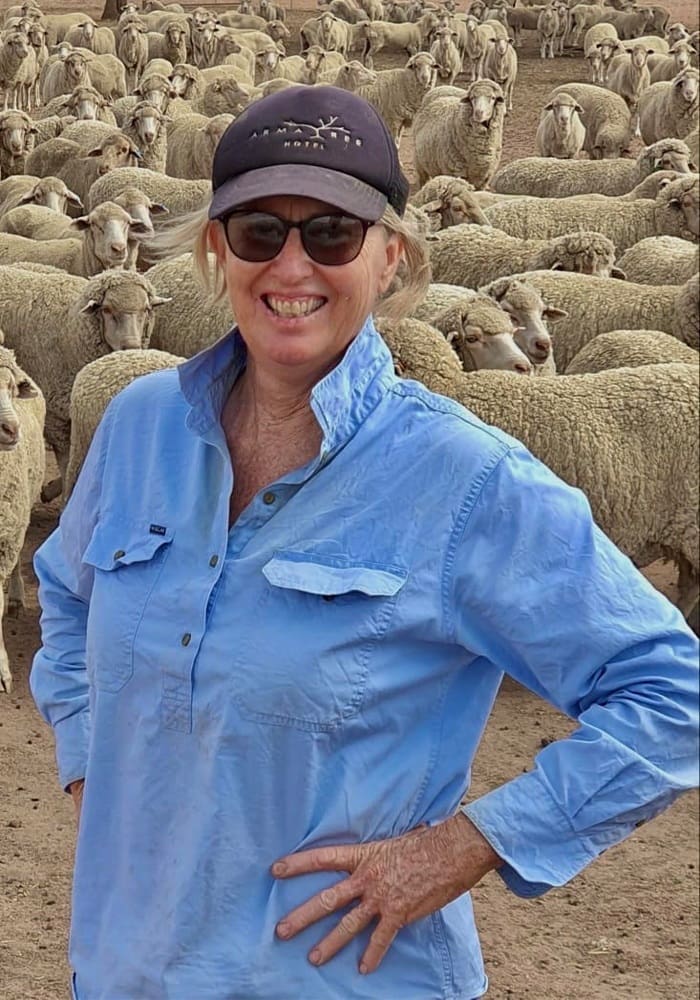
NSW Farmers Sheepmeat Committee chair Jenny Bradley. Image – MLA.
NEW South Wales farmers have reiterated demands that a national mandatory electronic identification system for sheep and goats be affordable, holistic and consistent between states.
Although the Agricultural Ministers’ Meeting on 9 September set an aspirational start date of 1 January 2025 for the mandatory EID sheep and goat system’s implementation and formed a Sheep and Goat Traceability Taskforce with government and industry representation, state farming organisations are still concerned about issues of cast-sharing, rules harmonisation and infrastructure.
NSW Farmers Sheepmeat Committee chair Jenny Bradley said her members were insisting any national system be affordable and not impact production.
“Given these reforms would have occurred with or without the support of NSW Farmers, it made a lot of sense to stake out our claims and be part of the process to secure better outcomes.
“The people pushing this reform need to remember that farmers produce food and fibre for people, and any move that reduces production will drive up prices for consumers,” Mrs Bradley said.
“Our members want to see affordable tags, financial assistance to adopt new technologies and a staged roll-out to ensure farmers aren’t left bearing the burden of these reforms.”
NSW Agriculture Minister Dugald Saunders announced during the NSW Farmers Annual Conference that the state would move toward a national traceability system, prompting support for a conditional in-principle urgency motion in support of the move after debate from members.
Mrs Bradley said NSW Farmers would provide in-principle support, but believed a national EID system must:
- have jurisdictional harmonisation,
- reduce tag costs to an economically affordable level (i.e. national tag tender),
- financially assist farmers and the supply chain to invest in technology,
- be underpinned by an equitable funding arrangement across the supply chain,
- ensure NLIS database has proven capability,
- retain the option of tag free pathways,
- a staged roll out over a five-year period,
- be developed in consultation with producers; and
- NLIS is the only system that is available for stock movements.
“We know from the Varroa mite outbreak that traceability is a key part of strong biosecurity systems,” Mrs Bradley said.
“However, we also recognise that these systems must support the industry, not hold it back, which is why it is so critical to bring farmers along on the journey.
“The sheep industry cannot afford to underestimate the value of having a robust traceability system that underpins our trade markets – we just want to make sure it is practical, affordable and fit-for-purpose.”
In a media release today, NSW Farmers said its support for improved traceability is ‘conditional’ and reforms will require several key concessions from decision makers.
Despite the increased risk of a Foot and Mouth Disease outbreak prompting Australia’s agricultural ministers to fast-track support for a mandatory national sheep/goat EID system by 1 January 2025, NSW Farmers today warned the reform needed to be nationally consistent and holistic. NSW Farmers suggested the cost and scale of the proposed system “could have a serious chilling effect on farm productivity, and urged those involved to take their concerns seriously”.
NSW Farmers is aligned with SAFEMEAT recommendations – SPA
Sheep Producers Australia chief executive officer Bonnie Skinner said the body is supportive of whole-of-system traceability reform and the recommendations proposed by SAFEMEAT to the National Biosecurity Committee in 2020.
“The interdependent recommendations included the establishment of a statutory harmonised governing model to manage Australia’s livestock traceability system, investment into the database to enhance existing functionality and support future traceability demands and automation, national electronic identification of all livestock species and the implementation of a sustainable and equitable cost sharing arrangements to ensure the ongoing maintenance of the system.
“NSW Farmers are aligned with the SAFEMEAT recommendations and the need for appropriate cost sharing arrangements, which need to be agreed to by industry and government and are crucial to the successful implementation of a national harmonised system,” she said.
“The government-industry Sheep and Goat Traceability Taskforce, of which Sheep Producers Australia is a member, has been established under the National Biosecurity Committee to jointly design a harmonised and fit-for-purpose implementation approach.”

The hypocrisy of the NSW Farmers Association is mind numbing. They wanted RFID, now they seem to be backing off if RFID fails to meet their criteria, especially the proven capacity of the database.
I see no mention of saleyard infrastructure to enable timely and accurate reading of EID tags. Victoria introduced the EID tags and to date there has been no report or evaluation of this around the above accurate and timely reading and throughput at saleyards. There has always been the questions of cost, accuracy and timely happenings, so there are no animal welfare problems or any other problems. There have been various requests on these matters to Victoria and to my knowledge there has been no information or reply. The current NLIS of sheep has been tested a number of times in NSW over the years and most reports have revealed a 90% + compliance rate within the time frames laid down. The one exception was property to property transfers, which may have been sorted.